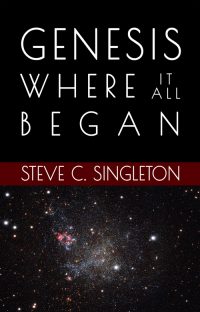 |
Genesis: Where It All Began by Steve Singleton (2006-04) $3.95
Here in outline form are 17 lessons on the Book of Genesis, which provide the foundation history and theological concepts for all of the rest of the Bible. Among other topics, this study covers Creation, the Fall, the Great Flood, the life of Abraham, the life of Jacob, and the life of Joseph. Special bonus is full-color graphical outline of Genesis. Ideal for church Bible classes for ages teen through adult, for small groups, or for your own personal study, if you want to dive deeper. How do we deliver our e-books? As soon as your payment clears with PayPal, you will receive a link for your Instant Download! Make sure you do the download within 24 hours of when you receive the link. By downloading, you are agreeing not to share your copy with anyone. At these prices, they can buy their own! Because all of our e-books are in Adobe Acrobat format, you will need the Acrobat Reader, available free from Adobe. |
![842018: Genesis: Tyndale Old Testament Commentary [TOTC]](http://ag.christianbook.com/dg/product/cbd/b180/842018.gif) |
Genesis: Tyndale Old Testament Commentary [TOTC] By Derek Kidner / IVP Academic The book of Genesis is both the Bible’s account of human origins and the herald of human destiny. It is a book swarming with significant questions. Who wrote it? When? Does the account of creation square with modern science? What about Adam and Eve? Derek Kidner not only provides a running exegetical commentary, but also lucidly handles the tough issues that Genesis raises. His clear prose and theological insight will expand readers’ understanding of God’s character and of human nature and destiny. This classic commentary has been completely retype set and presented in a fresh, vibrant new large paperback format, with new global branding. 236 Pages. Softcover from IVP. The Tyndale Bible Commentaries are designed to help the reader of the Bible understand what the text says and what it means. The Introduction to each book gives a concise but thorough treatment of its authorship, date, original setting and purpose. Following a structural Analysis, the Commentary takes the book section-by-section, drawing out its main themes, and also comments on individual verses and problems of interpretation. Additional Notes provide fuller discussion of particular difficulties. The aim throughout is to explain the true meaning of the Bible and make its message plain. Derek Kidner was formerly Warden of Tyndale House, Cambridge. |
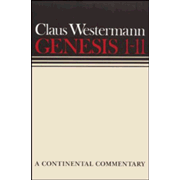 Genesis 1-11, Continental Commentary Series Genesis 1-11, Continental Commentary Series |
Genesis 1-11, Continental Commentary Series By Claus Westermann / Fortress Press Westermann’s commentary on the book of Genesis is divided into three volumes. The first volume comments on Genesis 1-11, which deals with the beginning of the world and the human race. The second volume comments on Genesis 12-36, and deals with the patriarchal story in the figures of Abraham, Isaac, and Jacob. The third volume comments on Genesis 37-50 and touches upon the Joseph story. In each of these volumes Professor Westermann offers an extensive introduction to the social and religious setting of the patriarchal period and an analysis of the shaping of the text of Genesis 12-36. Readers will also find features for each unit of the text as follows: rich bibliography, a new translation with linguistic notes, analysis of form and setting, verse-by-verse commentary, word studies and short essays on particular themes, and theological assessment. |
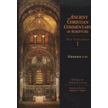 Genesis 1-11: Ancient Christian Commentary on Scripture Series Genesis 1-11: Ancient Christian Commentary on Scripture Series |
Genesis 1-11: Ancient Christian Commentary on Scripture Series By Andrew Louth, ed. / InterVarsity Press The rich tapestry of the creation narrative in the early chapters of Genesis proved irresistible to the thoughtful, reflective minds of the church fathers. Within them they found the beginning threads from which to weave a theology of creation, fall and redemption. Following their mentor, the apostle Paul, they explored the profound significance of Adam as a type of Christ, the second Adam. The six days of creation proved especially attractive among the fathers as a subject for commentary, with Basil the Great and Ambrose producing well-known Hexaemerons. Similarly, Augustine devoted portions of five works to the first chapter of Genesis. As in previous volumes within the Ancient Christian Commentary on Scripture, the range of comment contained in Genesis 1-11 spans from the first century to the eighth, from East to West, and from Greek and Latin speakers to Syriac. Especially helpful in this volume is editor Andrew Louth’s supply of Septuagintal alternative readings to the Masoretic text, which are often necessary to understanding the fathers’ flow of thought. Genesis 1-11 opens up a treasure house of ancient wisdom,allowing these faithful witnesses, some appearing here in English translation for the first time, to speak with eloquence and intellectual acumen to the church today. |
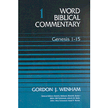 Genesis 1-15, Word Biblical Commentary Genesis 1-15, Word Biblical Commentary |
Genesis 1-15, Word Biblical Commentary Gordon J. Wenham (PhD, University of London) is tutor in Old Testament at Trinity College, Bristol, England, and professor emeritus of Old Testament at the University of Gloucestershire. He is the author or editor of numerous books, including Story as Torah and commentaries on Genesis, Leviticus, and Numbers. Vol. 2: Genesis 16-50 |
![20101: Genesis 1-11: New American Commentary [NAC]](http://ag.christianbook.com/dg/product/cbd/b180/20101.gif) |
Genesis 1-11: New American Commentary [NAC] By Kenneth Matthews / B&H Books Offering a thorough introduction that analyzes the literary structure of the first book of the Bible, Mathews also looks at its theology, contemporary interpretation, and relationship to the Pentateuch and ancient literature. Evangelical and NIV-based, this readable commentary features a verse-by-verse exegesis on chapters 1–11:26; explores translation issues; interprets the “Image of God”; and more. 528 pages, hardcover from B&H. |
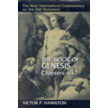 Genesis 1-17, New International Commentary on the Old Testament Genesis 1-17, New International Commentary on the Old Testament |
Genesis 1-17, New International Commentary on the Old Testament By Victor P. Hamilton / Wm. B. Eerdmans Publishing Co. Victor P. Hamilton makes a major contribution to the study of Genesis with this volume on the first 17 chapters. His extensive introduction discusses issues such as structure, composition, theology, and canonicity related to Genesis. The commentary derives from Hamilton’s own translation and thoroughly expounds the meaning of these foundational chapters. Further, each section concludes with a discussion of how the New Testament used material from the section discussed. Written from an evangelical perspective, Hamilton’s commentary will be valuable to those seeking an in-depth understanding of Genesis. |
![140255: Genesis: Anchor Yale Bible Commentary [AYBC]](http://ag.christianbook.com/dg/product/cbd/b180/140255.gif) |
Genesis: Anchor Yale Bible Commentary [AYBC] By E.A. Speiser / Yale University Press |
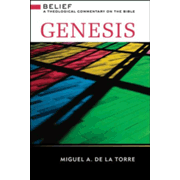 Genesis: Belief Theological Commentary on the Bible [BTCB] Genesis: Belief Theological Commentary on the Bible [BTCB] |
Genesis: Belief Theological Commentary on the Bible [BTCB] By Miguel A. De La Torre / Westminster John Knox Press A thought-provoking interpretation of Genesis—focused on pressing contemporary themes of liberation and concern for the poor and marginalized. Remembering Jacob’s wrestling at Peniel, De La Torre affirms that there are consequences when we truly wrestle with the biblical text, drawing from church tradition and contemporary culture to offer powerful theological, practical, and ethical insights. The volumes in Belief: A Theological Commentary on the Bible from Westminster John Knox Press offer a fresh and invigorating approach to all the books of the Bible. Building on a wide range of sources from biblical studies and the Christian tradition, noted scholars focus less on traditional historical and literary angles in favor of a theologically focused commentary that considers the contemporary relevance of the texts. This series is an invaluable resource for those who want to probe beyond the backgrounds and words of biblical texts to their deep theological meanings for the church today. |
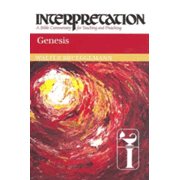 |
Genesis: Interpretation: A Bible Commentary for Teaching and Preaching By Walter Brueggemann / Westminster John Knox Press The aim of the Interpretation (IBC) Commentary is not to extend the knowledge displayed by other commentaries, but rather to bring the text of Genesis “closer to the faith and ministry of the church.” The risk of such an undertaking is easy to see, but the rewards are equally as great, and warrant any risk. Thus, one can expect a great deal of interpretation of the text, and at times it may be controversial. Nevertheless Brueggemann pushes forward with the interpretation of the text. Here you will find a steady exposition of the text of Genesis that attempts to bring together historical-critical research, and theological understanding and application. Primary for Brueggemann is the concept of “calling” in the book of Genesis. This is Brueggemann’s “center” in interpreting the book and it is distilled from the belief that “God calls the worlds into being” and “God calls us into the church”. This is all done for the purpose of considering the text of Genesis as addressed to the community of faith. The community does not seek to do what critical exegesis does, but the community does depend on critical exegesis in formulating a faithful theology, and response to the text. Thus, Brueggemann does not ignore scholarship, but seeks to appropriate it for a specific end, that of edifying the church. Anyone who desires to enrich their understanding of faith at a very profound level, without scholarly jargon will find this series and especially Brueggeman’s work here useful. Yet, Brueggemann does not leave the scholarly behind, he uses it to create an interpretation and understanding of this compelling, and often mistreated book. Genesis is ideal for pastors, educated laity, and undergraduate courses on the Pentateuch and/or Genesis. |
- Bible Study Links
- The Shallows
- The Depths
- DS Bookstore
- About DeeperStudy
- Contact DS
